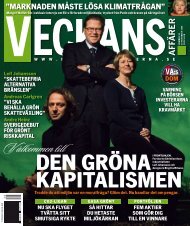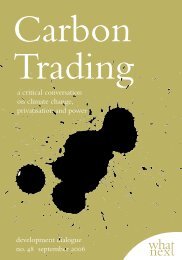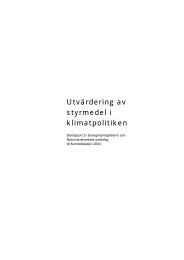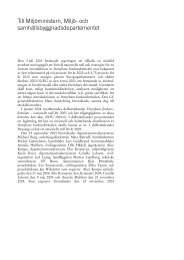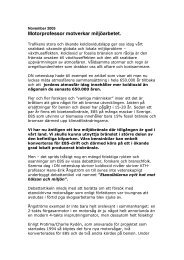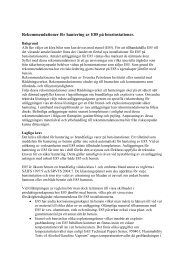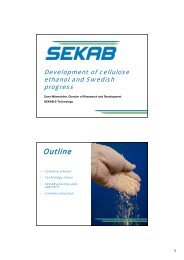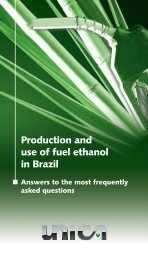Sugarcane ethanol: Contributions to climate change - BAFF
Sugarcane ethanol: Contributions to climate change - BAFF
Sugarcane ethanol: Contributions to climate change - BAFF
You also want an ePaper? Increase the reach of your titles
YUMPU automatically turns print PDFs into web optimized ePapers that Google loves.
Executive summary<br />
Do biofuels help <strong>to</strong> reduce greenhouse gas emissions and do they o�er new sources of<br />
income <strong>to</strong> farmers, by producing biomass? Are biofuels competing with food, animal feed<br />
and contributing <strong>to</strong> higher food prices? And are biofuels directly or indirectly threatening<br />
the environment, biodiversity, causing irreversible or undesirable <strong>change</strong>s in land use and<br />
landscape?<br />
�is publication aims <strong>to</strong> set the stage for the discussion about both challenges and<br />
concerns of sugarcane <strong>ethanol</strong> by providing the scienti�c context, the basic concepts and<br />
the approach for understanding the debate on biofuel-related issues. �is book largely<br />
limits itself <strong>to</strong> sugarcane <strong>ethanol</strong> and its contribution <strong>to</strong> <strong>climate</strong> <strong>change</strong> mitigation and the<br />
environment.<br />
�e main �ndings and conclusions are:<br />
1. �e dominance of Brazil in global sugarcane production and expansion – Brazil<br />
accounted for 75 percent of sugarcane area increase in the period 2000 <strong>to</strong> 2007 and<br />
two-thirds of global production increase in that period – derives from its experience<br />
and capability <strong>to</strong> respond <strong>to</strong> thriving demand for transport fuels, which was recently<br />
triggered by measures <strong>to</strong> mitigate greenhouse gas emissions of the rapidly growing<br />
transport sec<strong>to</strong>r, concerns in developed countries <strong>to</strong> enhance energy security and lessen<br />
dependence on petroleum, and not the least the need of many developing countries <strong>to</strong><br />
reduce import bills for fossil oil.<br />
2. According <strong>to</strong> the IIASA/AEZ assessment, the most suitable <strong>climate</strong>s for rain-fed<br />
sugarcane production are found in south-eastern parts of South America, e.g. including<br />
São Paulo State in Brazil, but also large areas in Central Africa as well as some areas in<br />
Southeast Asia. �e massive further expansion of sugarcane areas, e.g. as forecasted for<br />
Brazil, is expected <strong>to</strong> cause the conversion of pas<strong>to</strong>ral lands in the savannah region.<br />
3. �is study analyzes the land use <strong>change</strong>s (LUC) in Brazil caused by sugarcane expansion,<br />
looking both at the past and expected future dynamics. Remote sensing images have<br />
identi�ed that in 2007 and 2008 Pasture and Agriculture classes <strong>to</strong>gether were responsible<br />
for almost 99% of the <strong>to</strong>tal area displaced for sugarcane expansion which equals an<br />
area of more than 2 million ha. Pasture was responsible for approximately 45% and<br />
Agriculture was responsible for more than 50% of the displaced area for sugarcane.<br />
About 1% of sugarcane expansion <strong>to</strong>ok place over the Citrus class and less than 1% over<br />
the Reforestation and Forest classes <strong>to</strong>gether. Pasture displacement is more important<br />
in São Paulo and Ma<strong>to</strong> Grosso do Sul, while Agriculture is more important in the other<br />
states analyzed.<br />
4. �e shi�-share model using IBGE micro-regional data has analyzed sugarcane expansion<br />
from 2002 <strong>to</strong> 2006 and has identi�ed around 1 million ha in the ten Brazilian states<br />
analyzed. From this <strong>to</strong>tal expansion, 773 thousand ha displaced pasture land and 103<br />
thousands displaced other crops, while only 125 thousand ha were not able <strong>to</strong> be allocated<br />
<strong>Sugarcane</strong> <strong>ethanol</strong> 15



